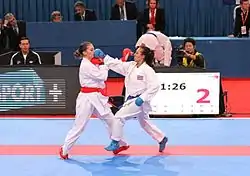Gyaku-zuki
The gyaku-zuki (Japanese: 逆突き, pronounced [ɡjakɯzɯki]) is an attack technique often also referred to as a reverse punch. This is used in many budō disciplines, e.g. in karate or aikidō. This is an embodiment of the choku-zuki (straight punch forward).[1][2][3]
| Gyaku-zuki | |||||
|---|---|---|---|---|---|
 | |||||
| Japanese name | |||||
| Kanji | 逆突き | ||||
| Hiragana | ぎゃくづき | ||||
| |||||
After a step forward from the zenkutsu-dachi position, a straight forward punch is made for each forward leg (chūdan or jōdan), with the hip twisted in, or the hip rotation supporting the impact. The gyaku-zuki is the counterpart to the oi-zuki, in which the impact is made to be the same in relation to the front leg.[4] While the oi-zuki is used as an attacking technique and with a full step forward, the gyaku-zuki is a counterattack that is used in a standing position, without a full step forward.
Also common are the two variants of performing the crotch and kick simultaneously, or supporting the thrust (without crotch) by simultaneously sliding the entire body and legs forward.
Example: In the left display, the execution of a gyaku-zuki is done by the karateka doing a kick with the right fist.
Literature
- Werner Lind: Lexikon der Kampfkünste. China, Japan, Okinawa, Korea, Vietnam, Thailand, Burma, Indonesien, Indien, Mongolei, Philippinen, Taiwan u. a. Sportverlag, Berlin 1999, ISBN 3-328-00838-1, (Edition BSK).
References
- Moritz, Eckehard; Haake, Steve (10 May 2010). Engineering of Sport 6: Volume 2: Developments for Disciplines. Springer Science & Business Media. ISBN 9780387460512. Retrieved 24 December 2017 – via Google Books.
- Kanazawa, Hirokazu (24 December 2017). Black Belt Karate: The Intensive Course. Kodansha International. ISBN 9784770027757. Retrieved 24 December 2017 – via Google Books.
- Rielly, Robin L. (6 November 2012). Karate for Kids. Tuttle Publishing. ISBN 9781462908134. Retrieved 24 December 2017 – via Google Books.
- Inc, Active Interest Media (1 July 1990). "Black Belt". Active Interest Media, Inc. Retrieved 24 December 2017 – via Google Books.